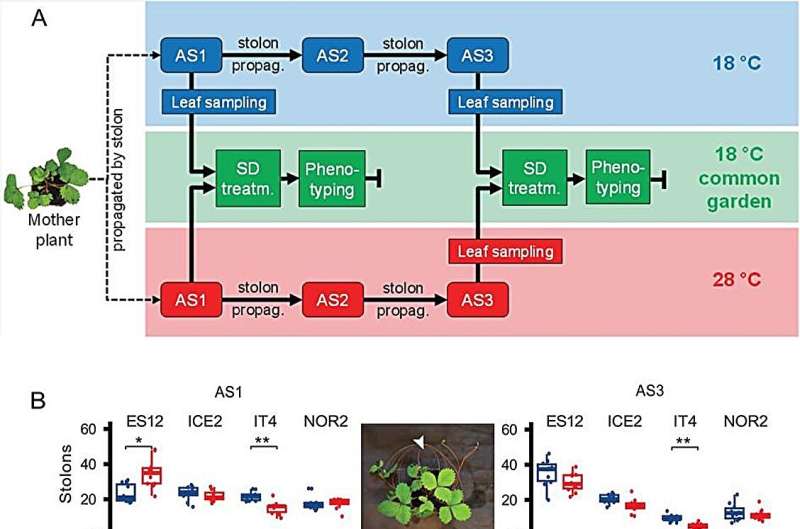This article has been reviewed according to Science X's editorial process and policies. Editors have highlighted the following attributes while ensuring the content's credibility:
fact-checked
peer-reviewed publication
trusted source
proofread
DNA methylation: The hidden mechanism enabling plants to adapt in a warmer world

As global warming continues to redefine ecosystems, plants are increasingly tasked with swift adaptation to ensure their survival. One primary mechanism facilitating such rapid adaptation is epigenetic memory, specifically DNA methylation.
DNA methylation, a form of epigenetic modification, involves the addition of a methyl group to the cytosine bases of the DNA, altering its accessibility in chromatin and modulating gene expression.
In the context of a warming climate, changes in DNA methylation can be triggered by environmental factors like increased temperature. Such epigenetic adaptations play an instrumental role in allowing plants to synchronize their growth with evolving environmental cues. However, a comprehensive understanding of how these DNA methylation changes affect plant phenotypes, especially in response to warmer temperatures, remains unclear.
In July 2023, Horticulture Research published a research paper entitled by "Warmer temperature during asexual reproduction induce methylome, transcriptomic, and lasting phenotypic changes in Fragaria vesca ecotypes".
To examine the influence of temperature on phenotypic and epigenetic variations, an experiment was conducted across three asexual generations on four European F. vesca ecotypes (ES12, ICE2, NOR2, IT4), exposing them to 18°C and 28°C.
At the phenotypic level, the ES12 ecotype had an increased stolon production at 28°C during the first asexual generation (AS1) but not by the third (AS3). Conversely, the IT4 ecotype displayed decreased stolon production at 28°C in both AS1 and AS3.
The ICE2 and NOR2 ecotypes showed significant delays in flowering time at 28°C by AS3, with statistical significance at 0.05 > p > 0.001. For petiole length, plants from the ES12, ICE2, and NOR2 ecotypes had longer lengths when grown at 28°C during AS1. By AS3, the increased petiole length remained only for the NOR2 ecotype.
The results showed a statistically significant difference between the all phenotypic traits investigated and growth temperature in the experiment, which can be preserved during asexual reproduction. Further in-depth studies at the molecular level, bisulfite-sequencing of the genomic DNA samples from the ecotypes revealed discernible differences in DNA methylation patterns between the two temperature conditions, especially in the CHG and CHH contexts.
NOR2 exhibited the most pronounced difference in methylation levels between the temperature conditions. Principal Component Analysis (PCA) of methylation profiles showed clear differences between ecotypes grown at 18 and 28°C. Significant changes in both hypo- and hypermethylation occurred across all ecotypes with the largest temperature-specific methylation increases observed for the CHH context. Notably, methylation changes were identified to be correlated with genomic features such as transcription start sites (TSS) and transcription termination sites (TTS).
Regions with differential CHG and CHH methylation typically exhibited hypermethylation. At the same time, transcriptome changes related to temperature increase were observed in approximately 3,500 to 5,000 differentially expressed genes (DEGs) in different ecotypes. In addition, this study also explored the ecotype specific methylation and expression patterns of genes related to gibberellin metabolism, flowering time, and epigenetic mechanisms. It was found that among three or fewer ecotypes, the absolute multiple change of 1,318 related differentially expressed and differentially methylated genes (DEDMGs) was>1.5.
In summary, the research indicates that temperature variations during asexual propagation induce considerable hereditary epigenetic and phenotypic modifications, underscoring the existence of a temperature-related epigenetic memory effect in F. vesca ecotypes.
This study not only deepens our understanding of plant adaptation but also opens the door for leveraging epigenetic memory to develop crops better suited to the warming world.
More information: YuPeng Zhang(张宇鹏) et al, Warmer temperature during asexual reproduction induce methylome, transcriptomic, and lasting phenotypic changes in Fragaria vesca ecotypes, Horticulture Research (2023). DOI: 10.1093/hr/uhad156
Journal information: Horticulture Research
Provided by NanJing Agricultural University


















